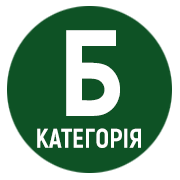Requirements for execution
Requirements for execution of the scientific articles for Herald of Lviv University of Trade and Economics. Technical sciences
Prohibition to refer to the aggressor state’s scholarly papers
It is prohibited citing and including in the reference list russian-language contributions published in any country, incl. papers written in other languages but published in russia and belarus.
• UDC is indicated at the left. For appropriate identification of UDC, it is recommended to use the link http://www.udcc.org/udcsummary/php/index.php?lang=uk&pr=Y
• Surname and initials of the author (–s). After full name separated by commas, one specifies e-mail of the author (-s), ORCID ID, Researcher ID, scientific degree, academic rank, post, affiliation, city (in the article’s language and in English). Abroad authors also mark a country.
• Article title is typed using capitals in the article’s language and in English.
• Abstract (at least 1800 characters) and Key words (5-8 words) are in the article’s language and in English. The summary must include the substantiation of the topicality of the research, outline its purpose, basic results personally obtained by the author (-s). If the article is not in Ukrainian, one has to provide Ukrainian abstract (at least 1800 characters) and key words (5-8 words).
• After Ukrainian abstract and key words, the author indicates JEL Classification code (-s) (alphabetical-digital system of the American Economic Association classifying scholarly literature in the field of economics). Ukrainian translation of JEL Classification is available at the link.
• The editorial office provides every article with a unique DOI (Digital Object Identifier) of the international system CrossRef which is indicted after the code (-s) of JEL Classification.
• According to the Decision of the Presidium of Higher Attestation Commission of Ukraine “On Advancement of the Requirements for Professional Publications included in the List of VAK of Ukraine № 7-05/1 as of January 15 2003, an article must contain (with obligatory highlighting in the text) the following elements:
- Problem statement (in general and its connection with important scientific or practical tasks)
- Analysis of recent researches and publications (ones which have the basis of solution of a particular problem the author relies on, specification of unresolved parts of a general problem the articles is devoted to)
- Tasks statement (setting goals of the article)
- The outline of the main research material (with a full justification of research findings)
- Conclusions and directions for further research in this area
• The article should be presented in A4 format of Microsoft Word (font – Times New Roman, font size – 14, line spacing – 1,5, margins: left – 3 cm, right, top and bottom – 2 cm, quote marks – “ ”). Filename has to meet the author’s surname (for instance, Pretrenko_article). If the article was written by several authors, the file is named by a surname of the first author.
• The article’s volume, including figures and tables, should be 11-17 pages.
• Bibliography must involve at least 10 items in source languages (exception – Chinese, Japanese, Korean and Arabic). In that case, a source should be translated into English with the indication of a source language in square brackets. Bibliographic entry is executed taking into account developed in 2015 the National Standard of Ukraine DSTU 8302: 2015 “Information and documentation. Bibliographic reference. General principles and rules of composition”.
To ensure the quality of scientific citations, the DOI of each source (if available) must be provided in the list of references.
• According to new rules, which have regard to requirements of international systems of citation, the authors have to indicate the list of sources in two variants: one is in a source language and the same list in a separate block (References) in Latin alphabet (Harvard Reference System), which doubles all literature sources regardless foreign ones. You can use http://ukrlit.org/transliteratsiia for the transliteration of Ukrainian sources/
• The amount of tabular material and figures should not be excessive. The digital material is presented in a table which has a serial number (for example, Table 1 (in italics) and a title (printed above the table in the middle in bold). Figures should also be numbered and have names, which are indicated under each of the figures in the normal font (for instance, Fig. 2. Dynamics of sugar production in Ukraine in 2013-2019). It is not allowed to submit two or more different tables or figures in a row in the article’s text.
• Figures made in MS Word need to be grouped; they must be represented by a single graphic object. For figures made in Excel, you need to send an Excel file in addition to the article.
• References to textbooks, study guides and popular science literature are undesirable.
• Formulas are executed using the built-in MS Equtation formula editor and are numbered to the right.
• When submitting the article, it is essential to take into account that the journal has black-and-white print and thus, the use of different colors, especially when using multicolor graphics and diagrams, doesn’t ensure their adequate presentation in printed copies. The editors recommend using patterned filling of diagram segments in black and white.
• All citations and statistics should be accompanied by references to sources which must be given in square brackets, for example, [3, p. 35; 8, p. 56-59], in which the first digit indicates the ordinal numerical order of the source in the bibliography, and the second - the corresponding page in this source; one source (with a page) is separated from another by a semicolon.
• The article shouldn’t have word breaks and macros. Mark paragraphs using "Enter", do not use spacebar or tabulation (“Tab”).
APPENDICES:
Appendix A. Sample of article execution.
Appendix B. Sample of execution of "Анотація” and "Abstract".
Appendix C. Examples of the execution of literature sources.



